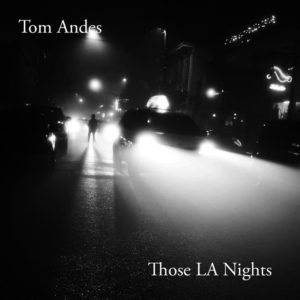Singer-songwriter and guitarist Tom Andes attracted attention two years ago with the release of his debut EP Static on Every Station and its buzzy REM-influenced title track. With his sophomore effort, Andes thinks of this second five-track installment as a companion disc to Static, hoping to eventually assemble each EP as a side of a vinyl record. The core of LA Nights was recorded a week before Static was recorded in 2021. Much of Static’s key personnel, drummer George Bishop, bassist Stoo Odom, and pianist Hannah Krieger-Benson, also appear here. Even the same Harahan studio, C.O.G Secret Lab Studio, was used.
What distinguishes Andes as a musical artist is that he’s also an accomplished fiction writer. It’s a good thing he shucked the advice of the others suggesting he only do one or the other. His songs have a literary sense that draws you into the mysterious lives of their protagonists.
Like Static, Those LA Nights kicks off with the catchy leadoff track “Those L.A. Nights.” It’s a tale of a person left behind after a close friend moves away, wondering what the departed life is like after everything seemed so golden. “This Town’s a Wheel” portrays a protagonist disdaining small-town life but will never leave despite its abject apathy. The title symbolizes how getting your car stuck in the mud or snow only sinks deeper the more you spin your wheels.
“That Yellow Cajun Moon” is a bit of a departure from Andes’ typical lyrical style since it follows the A-B-A-B pattern commonly heard in classic blues songs. It’s also a songwriting exercise where some lines contradict its predecessor. There is somewhat of a story here, a bewildering one about a Cajun accepting his environment.
Andes even crafts a story involving celebrated Mississippi author William Faulkner. It’s not really about Faulkner but a nerdy, well-read bookstore employee rejected by the woman of his dreams. In the end, he blames Faulkner for his failures, drinking heavily to ease the unrelenting pain.
What’s also interesting about Andres’ songwriting is he doesn’t reveal everything but leaves the finer details to interpretation. Additionally, the darkness of night is a recurring subtheme, which works perfectly with the dark characters he portrays. No one in these songs has command of their life. Even the back cover photo of the model invites analysis. Her disengaged, empty stare could easily be a character in several of these songs.
The arrangements feature a lot of Andres’ rocking guitar solos, accompanied by a tight studio band. The last song, “The Ones That Brought You Home,” features a generously lengthy sax solo by Paul Grass that almost feels like a rock-ish song attempting to evolve into jazz. With this in hand, there’s much to be anticipated when Andes returns with his next installment.




